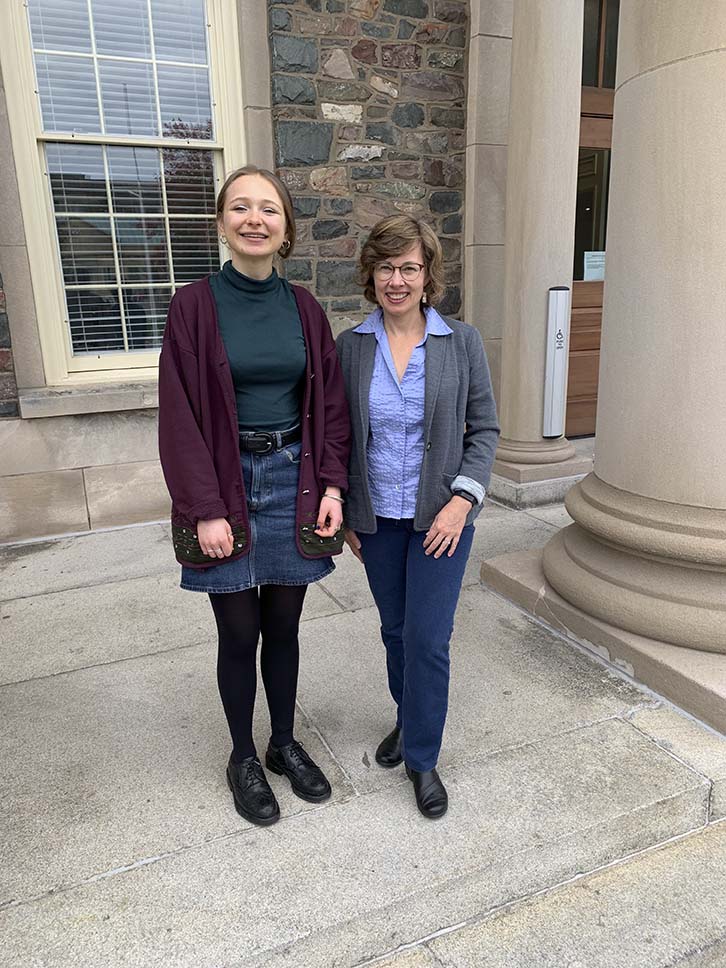Finishing university can be scary. Friend groups disperse, there’s no more familiar structure provided by a class schedule, and often, social pressure to immediately find a job and make one’s way in the adult world. But for the many students at King’s who study for humanities degrees, the path forward may be scarier. There’s the consistent question of “what can you do with a humanities degree?”
King’s alum Dawn Henwood, BA(Hons)’91, hopes to answer that question with the launch of her new program, referred to as the Liberal Arts Passport to Innovation (Passport).
Developed in the summer of 2021 with King’s student Nellianne Bateman, Passport will launch in winter 2022 as a non-credit course in which students develop skills such as creating an effective LinkedIn profile, designing a good resumé and networking for employment opportunities.
 “Leaving university can be like going to a new country, which is part of the reason why we called the program ‘Passport’,” Henwood says. “People speak differently and there’s new landscapes and cultures. We not only want to help students to see employment opportunities for their skillsets, but make sure they’re prepared for a professional environment.”
“Leaving university can be like going to a new country, which is part of the reason why we called the program ‘Passport’,” Henwood says. “People speak differently and there’s new landscapes and cultures. We not only want to help students to see employment opportunities for their skillsets, but make sure they’re prepared for a professional environment.”
Taking the form of six hour-long modules to be done over 12 weeks, Henwood and Bateman took special care to make sure that the program would be accessible to students with even the busiest of schedules.
“It’s supposed to be a stress reducer and not a stress increaser,” Bateman says. “You can’t get an A+ on an informational interview or ace a resumé. It’s supposed to be about reducing your anxiety about going into the work force.”
For Henwood, Passport’s design also plays into her love of experiential learning. As the founder of Clarity Studio, a Halifax-based company which helps innovators turn complex ideas into clear writing, it’s an approach she often uses to help clients meet their goals. Similarly, she intends to use this process to guide students in identifying their values—aiding their future job searches.
“Aligning my values with my work has been important throughout my career,” she says. “I value things like integrity, creativity and stewardship and knowing that has made my work life more fulfilling. A program like this really gets students to start digging in on their values which will hopefully help them in the long-term.”
Both Henwood and Bateman want students to come out of the experience with new perspectives. Passport will feature several guest speakers who’ve used their humanities degrees to pursue work outside the academic world.
“There’s a stereotype among King’s students that business and start-ups are evil, but they’re not,” Bateman says. “Hearing from these speakers will be really valuable in making students say stuff like ‘I don’t just have to be a professor; I can be a marketing coordinator.'”
But the team also wants to help bolster the confidence of those who take the program. Specifically, by helping students discover the progression between academic and workplace environments, Henwood and Bateman hope to establish a sense of similarity between the ‘life academic’ and life post-graduation.
“What this program emphasizes is not a set of skills you need to add on to your degree to be relevant in the real world,” Henwood says. “This is really about taking those intellectual skills and values that you’re learning now and creating the possibility for continuity.”
For Rachel Kimmelman, a King’s student who attended Changing the Career Paradigm—Henwood’s workshop in fall 2021—the experience of learning from Henwood and Bateman was a confidence-booster.
“I gained a lot of insight into the variety of careers that exist,” she says. “I also learned it can be fulfilling to never settle on one, and work on many different fulfilling projects throughout your life.”
Kimmelman also recalls being incredibly anxious before participating in the event, feeling uncertain about where her life would lead after she finished her degree. However, Henwood and Bateman’s willingness to engage with all the workshop’s attendees on a personal level proved to be a remedy.
“To a certain extent, this workshop put my mind at ease,” Kimmelman adds. “It reassured me that I have valuable skills that will help me find projects that I feel are valuable. It also taught me how to successfully find these projects as well as successfully gain employment with them.”
With registration for Passport now open, Henwood is optimistic that more people like Kimmelman will find the answers they’re seeking. After all, Henwood is basing the program on the things she wishes she’d known when she was a King’s student.
“I still remember being 30 years younger and wondering what to do with my English degree,” she says. “But really, it should have been ‘what can’t I do?'”
Learn more and register for Liberal Arts Passport to Innovation.

